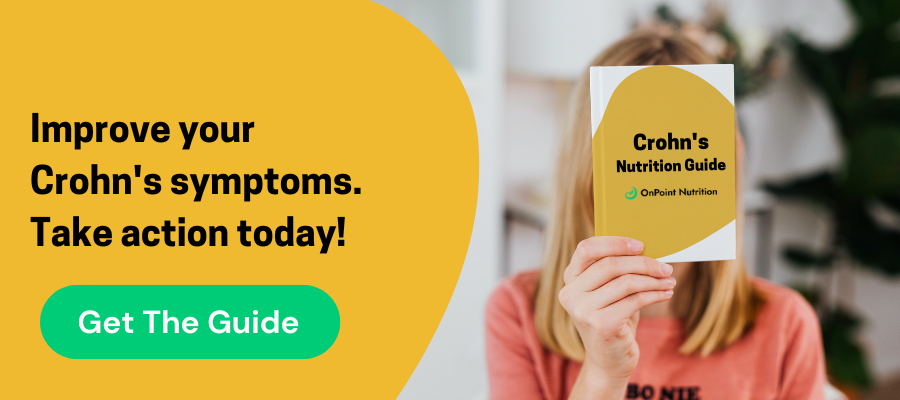
Feeling like you can't handle your Crohn's Disease on your own?
Crohn's disease is one of the numerous chronic illnesses fought in silence because of internal symptoms that cannot be seen.
Having your body feel terrible while appearing normal may be tremendously lonely.
Millions of Americans are weighed down by a chronic illness like Crohn's, on top of the everyday stresses of daily living.
Over 3,000 people have turned to OnPoint Nutrition for assistance with solving various health issues; hundreds of these people have irritable bowel disorders (IBDs), including Crohn's.
By taking advantage of OnPoint's Crohn's Disease management services, you may start feeling better fast.
Information is power and one of the first steps to getting started managing your chronic illness.
Here is a rundown with OnPoint's gut health dietitian, Kaitlyn Willwerth, MS, RD, CLT, of the most frequently asked questions for our clients dealing with Crohn's disease symptoms.
1. What is Crohn's Disease?
Crohn's, a type of chronic inflammatory bowel disease (IBD), is characterized by an immune response that causes inflammation of the gastrointestinal (GI) tract (mouth to anus).
Under normal circumstances, good bacteria in the gut exist without issue.
Still, with Crohn's, these bacteria are mistaken for hostile invaders, and your immune system attacks them, thus causing inflammation and subsequent problems.
2. What Causes Crohn's Disease?
While the exact cause of Crohn's is unclear, experts hypothesize there are a few triggers. Current research points to a combination of genetics, environment, and internal intestinal factors as Crohn's Disease causes.
While none of these factors are contagious to those around you, they may trigger your immune system mistakenly attack your gastrointestinal system causing inflammation and Crohn's symptoms.
3. Is Crohn's Disease Genetic?
While medical professionals are not sure of the exact cause, they believe genetics play a role in developing Crohn's Disease.
Environment and exposure to specific pathogens, among other things, may also play a role in determining your risk of getting Crohn's disease.
Symptoms of Crohn's disease often first appear in people's late teens, 20s, and 30s. However, recent studies have found that Crohn's Disease is becoming more prevalent in younger children, including infants.
Additionally, men and women tend to be equally affected by Crohn's, suggesting that gender plays no role in developing the disease.
4. Can you die from Crohn's Disease?
You are very unlikely to die from Crohn's disease itself. However, it is possible to develop Crohn's-related complications, which have serious health risks.
These complications are more likely to arise if you don't manage your Crohn's properly over a long period.
Some examples of life-threatening complications include:
- colorectal cancer
- Fistulas (holes in intestinal walls that form abnormal passageways from one organ to another)
- bowel obstruction
- colon perforations
5. How is Crohn's disease diagnosed?
The most common diagnostic tools for Crohn's disease are blood tests, stool studies, and colonoscopies. Your doctor will likely order a battery of tests to get a definitive diagnosis.
For example, while blood tests do not definitively confirm Crohn's Disease, they can indicate signs of anemia, a common condition for people with Crohn's. So using this test in conjunction with another method to identify Crohn's will be more definitive when determining if someone has Crohn's.
It is common practice to confirm Crohn's disease by a colonoscopy. During a colonoscopy, your doctor can view your entire colon using a thin, flexible tube with a camera attached. As part of this process, a biopsy can examine tissue for inflammatory cells.
6. What Triggers Crohn's disease?
The exact cause of Crohn's is still unknown, but many studies point to the fact that heredity and malfunctioning immune systems contribute to its symptoms. After Crohn's is present, many different things can trigger your symptoms.
These foods include:
- alcohol
- high-fat foods
- carbonated beverages
- caffeine
- dairy products
- foods that are very high in fiber.
7. What is the life expectancy of someone with Crohn's disease?
When Crohn's is well-managed, people enjoy average life expectancy with a high quality of life! Taking proactive measures to maintain effective treatment for Crohn's is strongly encouraged. So no need to feel like a Crohn's diagnosis is an early death sentence. During treatment, it is common to seek the advice of experts such as a doctor to manage possible medications and a qualified dietitian to guide dietary recommendations.
8. Can you live with Crohn's without medication?
For the most effective treatment of Crohn's, many people will need to take long-term medication. You may experience a return of symptoms if you stop taking your medicine, which keeps you in remission. Inflammation of the gastrointestinal tract (GI) system that persists over time can cause severe harm and even problems. Thus flare-ups should be treated urgently. But several dietary adjustments can be made to lessen overall intestinal inflammation. A healthy diet can reduce the dosage and frequency with which drugs are required.
The bottom line is a Crohn's diagnosis is severe, and it's essential to obtain reliable answers to your questions.
Work with your healthcare team to create the best treatment plan for you. If you are overwhelmed or need help managing your condition, consider meeting with a dietitian. One of the most important aspects of controlling Crohn's is keeping the disease under control with diet.
9. Is Crohn's Disease Contagious?
No, Crohn's disease (though the name sounds harrowing) is not contagious.
There are two stages of Crohn's Disease: active flare and remission. During an active flare, inflammation is heightened, and symptoms are active. During remission, there are no symptoms present.
Whether you are in an active flare or remission, Crohn's disease is not contagious and cannot be spread to others.
10. How Can An Online Dietitian Help With Crohn's?
To lead a happier, healthier life, a knowledgeable nutrition coach, such as a registered dietitian, will consider your particular circumstances as they relate to your Crohn's.
After receiving your diagnosis, follow a conscious diet that appropriately nourishes your body while avoiding foods that aggravate your Crohn's disease, which can lead to inflammation.
Distinguishing this balance can only be possible with awareness of this chronic condition and training in dietetics.
It is no easy task to undertake a lifestyle overhaul, but step-by-step learning more about better nutrition and new habits will bring you closer to avoiding flare-ups and feeling better.
If you have read this far, you are prepared to take charge of your health and adopt a lifestyle that will help you be the best version of yourself.
You are not helpless in the face of your diagnosis.
Taking the Next Steps
Crohn's disease can diminish a person's quality of life in many ways. Daily routines might be disrupted, and opportunities for enjoyment can be lost.
Crohn's wreaks havoc on your digestive tract creating disruption and discomfort in your life; although it may feel insurmountable at the moment, Crohn's disease may be managed.
It doesn't have to be this way.
By now, you know that a dietitian can be the answer if you are ready to commit to a sustainable health journey where your symptoms are under control, and you are free of the vice grip Crohn's has on your life.
But we know that Crohn's disease can be controlled and that consistency and persistence are the keys to long-term success.
During your time with our online nutrition program, a registered dietitian will ensure you're making progress and getting the most out of your program.
Our team of experts has helped more than 3,000 clients on their health journey. We constantly monitor cutting-edge studies and modify our practices based on what has proven successful in the medical field.
Using this data, you can permanently reduce your symptoms, avoid future issues, and enhance your quality of life.
Let's put you in a position of strength to pursue the healthier lifestyle you deserve.
Topics

With a knack for turning complex nutrition facts into engaging, relatable content, she’s on a mission to make healthy living fun and accessible. Backed by a stellar team of Dietitians and Nutritionists, Abby breathes life into OnPoint’s mission, inspiring others to embrace the transformative power of good nutrition. Her infectious enthusiasm and innovative approach make her a driving force in the journey towards better health for all.




